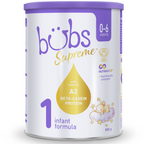What are the Different Types of Baby Formula?
As a new parent, one of the most crucial decisions you will make is choosing the right formula for your baby. With numerous types of baby formula available, it can be overwhelming to select the right one. In this blog post, we will explore the different types of infant formula and their benefits, helping you make an informed decision for your little one.
What are the different types of baby formula?
As mentioned earlier, there are different formula bases and stages that you need to consider when selecting baby formula. At Bubs Australia, we offer two types of formula milk - goat and cow. Both types of milk are excellent options for babies, and it all comes down to personal preference and any dietary requirements or allergies that your baby may have. There is no best baby formula, only the best for your specific baby’s needs.
Goat milk formula has smaller fat globules than cow milk formula, which makes it easier to digest. Additionally, it contains a higher proportion of medium-chain fatty acids, making it more comfortable for babies to digest. On the other hand, cow milk formula is a more common formula option that is easily accessible in most stores. It is also slightly cheaper than goat milk formula.
What is Stage 3 formula?
Stage 3 formula is for babies over twelve months, and it is formulated to meet their increased nutritional needs as they become more active and require more calories. Junior formula is designed for toddlers aged between one and three years and is formulated with added vitamins and minerals to support their growth and development.
What are the nutritional benefits of formula?
Breast milk provides unique health benefits to your baby that cannot be replicated in formula. However, formula manufacturers strive to develop formulas that are as close to mimicking breast milk as possible.
Formula milk contains nutritional benefits, including protein, vitamins, and minerals that are essential for your baby's growth and development. While no formula can replicate the unique health benefits of breast milk, different types of formula today are carefully designed to provide a comprehensive range of nutrients that support your baby's health and development.
Can you use two different types of baby formula?
Can you use two different types of baby formula? Generally the answer is yes, as long as you follow standard mixing instructions and they contain the same basic ingredients. However, it is crucial to monitor your baby's reaction to the mixing, as they may experience digestive issues such as constipation or diarrhea. It is always best to consult with your pediatrician before introducing new formulas or making any changes to your baby's diet.
Being a new parent trying to decipher the different types of formula and which is the best baby formula can be a confusing process. With our guide, hopefully you are able to narrow down your choices and find what works best for your little bub. It’s important to remember that this is just a guide, so be sure to consult with or seek advice from a healthcare/medical professional about formula types and choosing one that suits your baby’s nutritional needs. For more information, see our guide on how to combine formula and breastfeeding.


